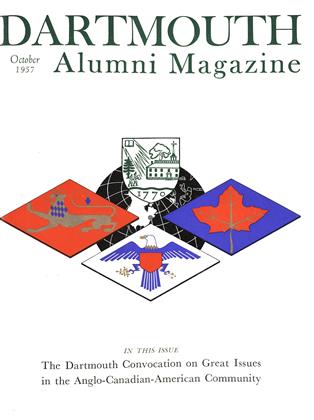THE summer diggings, to the north and east of the central green, were not enough in evidence to bring on another mock storming of the ramparts by the Bell Telephone executives who were in Hanover for an eight-week course in the liberal arts. This second summer program sponsored by the company was attended by 46 men, approximately the same number as last year, from July 2 to August 24. During the same eight-week period, 32 bankers from the northeastern states were taking a similar course in the liberal arts and the philosophy of money and banking, sponsored at Dartmouth by the National Association of Mutual Savings Banks. Both the telephone executives and the bankers were taught by Dartmouth professors, under the deanship of Prof. Arthur E. Jensen, and housing was provided in the dormitories.
The eighth annual summer session of the Graduate School of Credit and Financial Management at Tuck School brought a larger group to town. Some 190 men were enrolled in the three classes. For four days prior to the regular session, 22 alumni of the Graduate School, who had completed the three-year program at either Dartmouth or Stanford, met at Tuck for the first alumni conference. Later in the summer, from September 9 to 12, Tuck School was host for the second time to the Vermont-New Hampshire School of Banking, which drew 100 bankers from the two states.
Two other gatherings during the vacation period dealt with national security and mathematics. Forty representatives of the armed services, foundations and the teaching profession met in Hanover, June 24 to 26, under the sponsorship of the Committee on National Security Policies of the Social Science Research Council. John W. Masland, Professor of Government, took a leading part in the meetings. For one week, August 21-28, some 275 mathematics teachers gathered at the College for the ninth annual institute of the Association of Teachers of Mathematics in New England. Five members of the Dartmouth faculty participated in the program.
While these various groups were coming and going, and helping to dispel any somnolence in the Hanover scene, a group of eighty visiting scholars were staying relatively put and working in Baker Library. The visitors came from 39 colleges and universities in all parts of the country, and carried forward writing or research projects in such fields as history, geography, philosophy, law, anthropology, education and psychology. Historians (fourteen) predominated in the roster of scholars making use of Baker's excellent resources.
 View Full Issue
View Full Issue
More From This Issue
-
 Feature
FeatureFirst Panel Discussion
October 1957 By SIR GEOFFREY CROWTHER -
 Feature
FeatureOpening; Assembly
October 1957 By THE HONORABLE LEWIS W. DOUGLAS -
 Feature
FeatureFinal Assembly
October 1957 By THE HONORABLE JOHN GEORGE DIEFENBAKER -
 Feature
FeatureTHE DARTMOUTH CONVOCATION ON GREAT ISSUES IN THE . ANGLO – CANADIAN – AMERICAN COMMUNITY
October 1957 By GEORGE O'CONNELL -
 Feature
FeatureFirst Panel Discussion
October 1957 By CLARENCE B. RANDALL -
 Feature
FeatureHonorary Degree Ceremony
October 1957 By SIR WILLIAM HALEY







